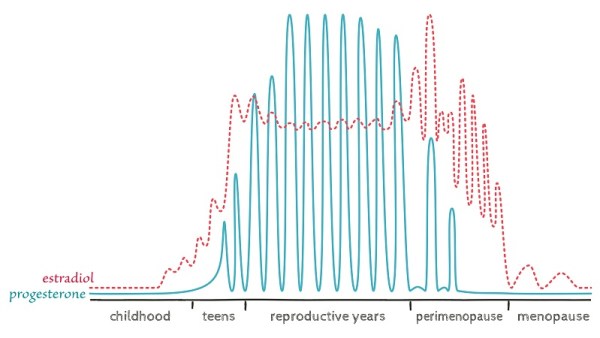Written

Night sweats, mood swings, and crazy heavy periods. Is this menopause already? And you’re only 42? No, menopause could still be a decade away. This is perimenopause or second puberty, which is the two to twelve years before your final period.
Perimenopause is different from menopause, which is the life phase beginning one year after your final period.
Perimenopausal symptoms are temporary (thank goodness) and respond to simple treatments provided below.
The first step to feeling better in your forties is to understand what’s happening with your body. Put simply, during perimenopause, estrogen goes on a roller coaster ride while progesterone quietly leaves the scene.
Ovarian Hormones through the Lifespan

Estrogen goes on a roller coaster ride
Starting from your late thirties, your estrogen could start to fluctuate and soar to almost three times higher than when you were younger—only to crash down again to almost nothing. Over and over again, month after month. I call this the estrogen roller coaster of perimenopause.
Symptoms of high estrogen include breast pain, heavy periods, fluid retention, irritable mood, and (in some cases) a histamine or mast cell reaction.
Symptoms of dropping estrogen include depression, weight gain, hot flashes, and night sweats.
Progesterone becomes deficient
At the same time estrogen is crashing up and down, progesterone is quietly going away. Which is unfortunate because progesterone could have sheltered your nervous system from the turbulent ups and downs of estrogen.
Progesterone drops with perimenopause because progesterone is hard to make. Unlike estrogen (which is made on the way to ovulation), progesterone is made only after ovulation—and ovulation is hard to do. Especially as you move into your forties and start to have more anovulatory cycles.
Symptoms of low progesterone include insomnia, heavy periods, and frequent migraines.
How to feel better in your forties
Stabilize your nervous system with magnesium and the amino acid taurine—two nutrients that can relieve hot flashes and improve sleep.
Reduce histamine and mast cell activation to reduce your sensitivity to estrogen.
Prevent estrogen from spiking too high by reducing alcohol, supporting a healthy gut microbiome, and taking supplements such as iodine and calcium-d-glucarate. Read How to lower estrogen.
Take bioidentical or body-identical progesterone (brand names Prometrium or Utrogestan) which can relieve symptoms of both estrogen excess and estrogen deficiency. Progesterone also stabilizes the HPA (adrenal) axis and supports thyroid function. Read Guide to using progesterone for women’s health.
For more, read my new book Hormone Repair Manual: every woman’s guide to healthy hormones after 40.
 Lara Briden is a naturopathic doctor and bestselling author of the books Period Repair Manual and Hormone Repair Manual — practical guides for treating period problems with nutrition, supplements, and bioidentical hormones.
Lara Briden is a naturopathic doctor and bestselling author of the books Period Repair Manual and Hormone Repair Manual — practical guides for treating period problems with nutrition, supplements, and bioidentical hormones.
With a strong science background, Lara sits on several advisory boards and is the lead author of a 2020 paper published in a peer-reviewed medical journal.
She has more than 20 years’ experience in women’s health and currently has consulting rooms in Christchurch, New Zealand, where she treats women with PCOS, PMS, endometriosis, perimenopause, and many other hormone- and period-related health problems.
Read more about Lara’s education, qualifications, affiliations, and scientific advisory roles.
